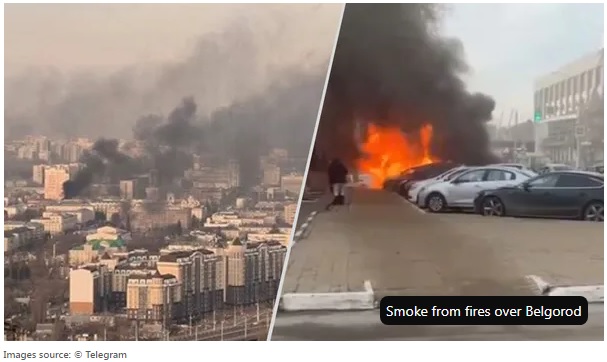
On January 1, 2024 Russian President Vladimir Putin said that the Ukrainian attack on the Russian city of Belgorod on December 30th "would not go unpunished," reminds Stephen Bryen, a former Deputy Under Secretary of Defense.
The Ukrainian attack on Belgorod (there were other attacks reported on January 2nd, but it did far less damage, and an attack on Donetsk, again aimed at civilians) killed at least 21 in Belgorod, including four children, and wounded 111, including 17 children. All the victims were civilians and there is no evidence that any of the Ukrainian targets were, even marginally, military. No Russian soldiers were killed.
According to Russia's UN Ambassador Vasily Nebenzya, the Belgorod targets included an ice rink, sports center and a university.
Russia says that the rockets used cluster munition warheads. The US previously supplied 155mm Dual Purpose Improved Conventional Munitions (DPICM), which are cluster munitions rounds, mostly because the US ran out of conventional 155mm rounds. It isn’t clear if the Ukrainian MLRS or the Czech Vampire have cluster warheads, although neither the Ukrainians or the Czechs made any denials about the use of cluster rounds in Belgorad.
The Russians asked for an emergency UN Security Council Meeting, alleging that the Ukrainian attacks were aimed only at civilians and that cluster munitions were used. Russia also blamed the Czechs for supplying RM-70 Vampire multiple rocket launchers that were used in the attack, paired with Ukrainian Olkha (Vilkha) rocket launchers that fire 300mm rockets.
On January 2nd, according to TASS (the Russian news agency) Russia shot down 17 Olkha rockets in the Belgorod region.
According to the Russians, the attack on Belgorod was carried out directly under orders from Ukrainian President Zelensky. The operation was launched by the Kraken regiment. The Kraken Regiment is a Special Forces unit under the command of the Main Directorate for (Military) Intelligence (GUR) headed by Kirill Budanov.
It may be that such attacks could trigger far different results for Ukraine and among its supporters. Russia, singling out the Czechs, for example, could indicate deeper Russian plans to also punish the suppliers, which could lead to a wider conflict. Even if the Russians confine the fighting to Ukraine, there are other dangers ahead for Ukraine. One of them is the loss of Western support as the fear of an expanding conflict triggered by Ukrainian attacks directly on Russian cities could impact NATO's tenuous hold on European security. That fear may hasten efforts to arrange a deal with Russia before everything spirals out of control.
Another is the shifting political framework in Europe. While Poland may or may not want to fight the Russians, there is little enthusiasm elsewhere, with political change looming. Even the UK, fervent supporters of Ukraine and wanting to keep up the fight, Britain is just about out of weapons and supplies (and money) and its Tory government is at risk of electoral defeat. The political problem worsens on much of the continent, including Germany, whose economy is sinking and whose military preparedness is shockingly in deficit. It is very risky if the conflict expands into Europe, and Zelensky's Belgorod attack can't win many votes inside NATO capitals.
Zelensky's attacks on a Russian city, whether warranted or not, is a mistake and may be a fatal self-inflicted wound, Stephen Bryen stresses.
read more in our Telegram-channel https://t.me/The_International_Affairs

 10:36 04.01.2024 •
10:36 04.01.2024 •






















